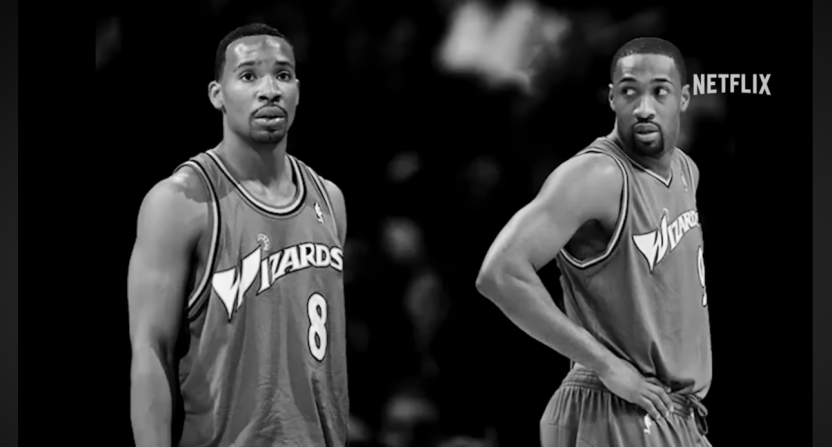The Washington Wizards have been largely an irrelevant NBA franchise for most of their existence. They haven’t reached the conference finals since 1979. Only twice this century has the nation paid attention to them. The first time was when Michael Jordan came out of his second retirement to play in D.C. for two seasons (2001-02, 2002-03). The last time was almost 16 years ago because of an infamous locker room incident.
The latest Untold documentary from Netflix is aptly titled Shooting Guards. It tells the story of how Wizards guards Gilbert Arenas and Javaris Crittenton tried to settle a dispute by bringing firearms to work, and how that disagreement impacted their lives. Call it toxic masculinity run amok. We may never know the full story, but Untold does a good job of having the participants and key observers tell their versions of the truth.
The Untold episodes have come under criticism in recent years. Swamp Kings was a hugely disappointing feature on Urban Meyer’s Florida Gators. The Murder of Air McNair didn’t provide much that was new. Sign Stealer served as a public relations piece for Connor Stalions. We are never going to get Ezra Edelman-level filmmaking here. However, Untold should aim for better storytelling and context. Shooting Guards succeeds in taking us behind the scenes before, during, and after the gun incident.
Arenas and Crittenton are motivated to show the best image of themselves. They describe what led to their hostile encounter in the hopes of gaining sympathy. But the best interviews in Shooting Guards come from people who weren’t professional athletes. Peter Vecsey, a longtime NBA insider, explains exactly how he broke one of the biggest stories of his career. Vecsey delightfully details how his league-wide network of sources uncorked something Washington wanted to keep bottled up.
When the front-page story came out in the New York Post in January 2010, everyone was talking about it. It wasn’t just a sports story. Feuding teammates with guns in an NBA locker room became a national hot topic. The result was Arenas and Crittenton being suspended for the rest of the season. Arenas, a former All-Star, salvaged a few more seasons in the NBA. Crittenton never played in the league again.
Crittenton’s life spiraled down with fatal consequences. In 2011, he accidentally killed Jullian Jones, a 22-year-old mother of four, while attempting to shoot an alleged gang member who he said stole from him. Crittenton pled guilty to manslaughter and was sentenced to 23 years in prison. However, he was surprisingly released in 2023. Shooting Guards sheds more light on this with the help of revealing interviews from retired Atlanta police detective Vince Velazquez and Jones’ mother, June Woods. The final 22 minutes of the 85-minute documentary are fascinating.
Shooting Guards is far from perfect. This documentary should have been 30 minutes longer. Additional information, interviews, and follow-up questions are missing. We get very few details on Crittenton’s intended target. Also, more facts about Jones and her children would have been welcome. Not surprisingly, the NBA and the Fulton County District Attorney’s Office did not respond to the film’s request for comments.
The Wizards, once known as the Bullets, adopted “a nickname that portrayed a non-violent image” in 1996. The NBA doesn’t play when it comes to guns. See: Ja Morant. However, this might be the perfect documentary to show at the league’s rookie symposium because it shows how a terrible decision can cost you your career, reputation, and freedom. For that reason alone, Shooting Guards is mostly on target.
